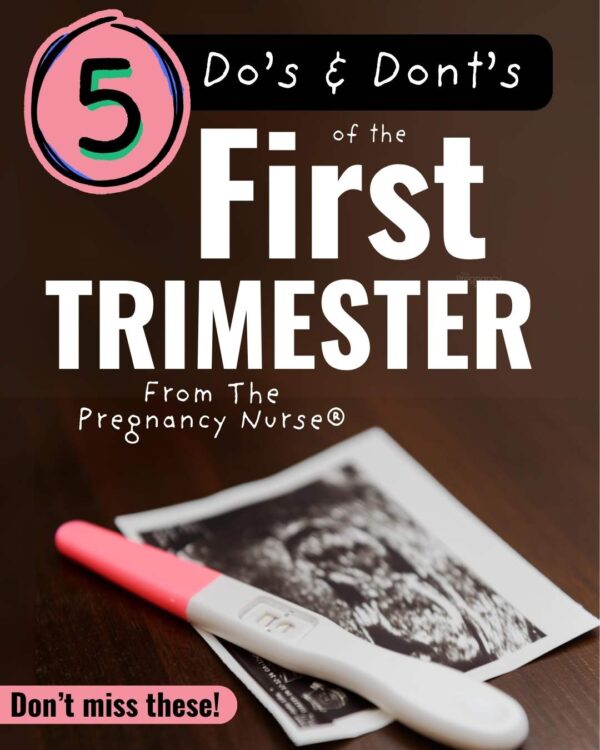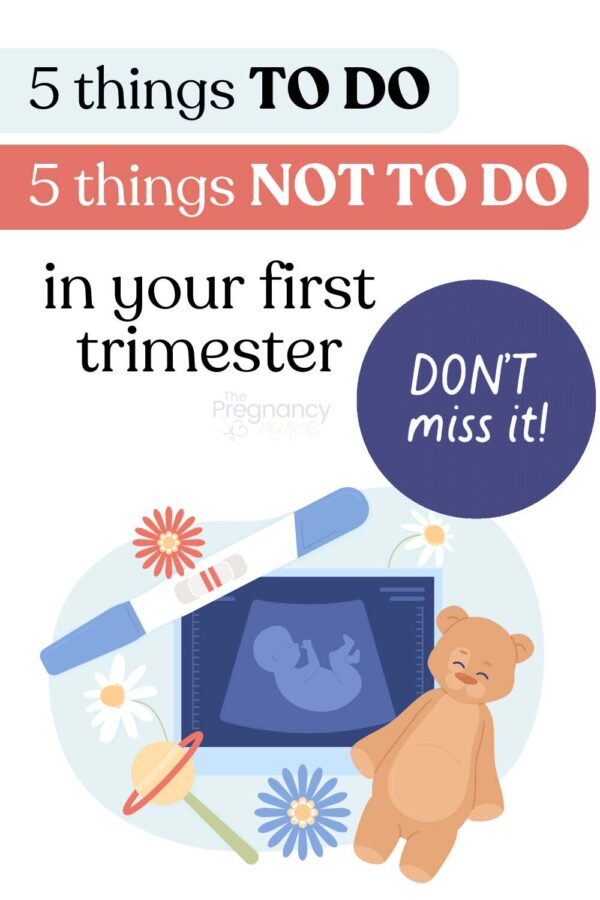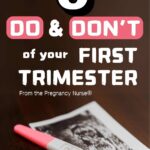The first trimester can feel tricky, and I’m finding more and more people are having their first prenatal appointment later than they’d like — so let’s talk about the DO’s and DONT’s of those first few weeks!

Don’t miss my other first trimester tips right here.
Before we get started — you seem like the type who loves to be organized — grab my organized before delivery checklist right here to get started right away:
DO Take a Prenatal Vitamin
I am hopeful you’ve been taking a prenatal vitamin before you learned you were pregnant, but in case you haven’t I seriously want to you stop reading this article, and grab the nearest prenatal vitamin and take it.
While you’re mostly looking for folic acid in these first few weeks (studies and data show that it prevents neural tube defects), there’s lots of other good stuff in prenatal vitamins – so don’t JUST take the Folic Acid.
It is the recommendation that anyone who can become pregnant take a prenatal vitamin for you and your baby’s health. Often you don’t even know you’re pregnant during the weeks that are most vital to take them.
Do NOT Freak Out Over Prenatal Vitamin Options
There is SO much about prenatal vitamins out there. And frankly, I am also apalled by how little vitamins are in some actual “prenatal vitamins” but either way now isn’t the time to freak out about the BEST one. It CAN be really overwhelming. In fact, if you want to do that my friend at Feed your Zest has a prenatal vitamin guide that simplifies it.
Find one at a quality retailer, that has hopefully been 3rd party tested and take it.
If taking a prenatal vitamin makes you sick look at taking it another time of day, or at some of the gummy or water options out there. Prenatal vitamins are needed. Remember often that baby will just take what it needs from YOU, leaving you less healthy after birth.
DO Keep Eating the Rainbow
I think people immediately get very wary of food once they find out they’re pregnant. Even my friends who get serious morning sickness still feel pretty good until closer to 6-8 weeks. Eat the rainbow as long as you can.
If you find that you’re not able to keep specific things down try to eat what works, and if you’re not keeping anything down contact your provider. Some people also have luck with lollipops for nausea.
IV’s are fun at all, but sometimes you get into a loop of dehydration that it’s hard to get out of. Sometimes a bag of IV fluids can make you feel human again and start over. It’s worth talking to your provider about if you’re not keeping down fluids.
Not sure what to wear? Check out my post on early pregnancy clothes!
Do NOT eat a few specific things….
Now, the reality is that most of the world is FINE to eat when you’re pregnant, but there are a few specific things you want to avoid. The big ones that most people find annoying:
- Deli meat (unless cooked til’ steaming)
- Soft cheeses or unpasturized cheeses
- Sushi (along with other raw fish, and a few other types of fish high in mercury).
- Wine (no amount of alcohol is safe in pregnancy)
I actually have a whole safe eating guide you can grab right here that goes into more about why and what else to avoid:
DO get that prenatal appointment scheduled
Now is the time to get that first prenatal appointment scheduled. Most often it should happen before the end of your first trimester, but I am hearing some providers are so back-logged it’s not happening til’ later.
In that case, I’d take the available appointment, and keep calling around (be sure to cancel it if you find someone else).
Either way, get calling and figuring out who to see early in pregnancy. They’ll have some important lab work, some questions for you and will likely schedule an early ultrasound to check for baby’s size and dates.
BTW, if you don’t know your due date I have calculator right here that gives you both your due date and some other special dates to keep watching for.
Want to know more about picking a provider — check out these posts:
- 6 Things Your Provider Does at Prenatal Appointments that Are Important
- The Best Providers for Your Baby’s Arrival: A Deep Dive with CNM Juli Pyle
- Picking Your Pregnancy Healthcare Provider
Do NOT get tied to that provider…
FAR too often I see people picking a provider that can get them in, only to find out that provider really isn’t a good fit — but they stay with them because they think they have to.
Here’s a few truths:
- You can pretty easily switch providers during your pregnancy, especially up to about 30 weeks.
- There are lots of kinds of providers out there, they’re not all the same
- Check into a certified nurse midwife (CNM’s), they are often my favorites (and can easily manage a low-risk pregnancy, and have plans if you need more than that).
Want to know more about midwives:
Note: There are a few different kinds of midwives out there. Certified nurse midwives (CNM) are nurses who went for more schooling and can now manage deliveries on their own, often in birth centers or hospitals. That is very different than a lay or a licensed midwife who delivers at home.
Don’t be afraid to keep looking around until you head into your third trimester. Hopefully, by then, you have found a good fit.
If you do switch be sure to ask for all your prenatal records, so you don’t need to repeat any testing.

DO Revel in the Miracle
Pregnancy is truly AMAZING. You do one thing and suddenly a human is growing inside of you.
It’s OK to be a bit starry-eyed about what’s going on and what the future will bring. I say enjoy those moments of peace, joy and happiness. It’s a wonderful thing. 🙂
Do NOT Spend Your Time in What If’s
I am also hear to say that the first trimester can bring a lot of “what if I lose this baby” thoughts.
The reality is that no thoughts like that will prevent it, in fact almost nothing you do can really keep that baby in any longer. So, it really is smartest to not torture yourself with it (even though I have plenty).
For me, I sort of revel in it briefly, and then ignore it as much as I can early on. I have plenty to get done and I just try not to think about all the what if’s as much as I can.
I am a HUGE what if’er, and I love control — so that first trimester is hard for me — even me — the Pregnancy Nurse!
DO Ask Your Provider About Aspirin Use
One thing that’s new to the pregnancy scene is the use of Aspirin if you have any risk factors for hypertension (high blood pressure) or preeclampsia.
You’re supposed to start this before your 13th week, if possible — at the VERY least by 20 weeks (you want it to be there as the placenta grows). So, if you provider isn’t seeing you til’ 13 weeks ask them if you can be screened over the phone for it.
If you are being seen prior to 13 weeks be SURE to ask about it at your visit.
If your provider doesn’t talk about it, it’s a red flag for me 🚩. It should be done at your first visit (or before). While they know some basic OB history about you, they don’t know your family history and there may be reasons to take it they haven’t covered.
Do NOT Get Sucked into Pregnancy Stories
It is really easy to start to listen to ALL the pregnancy stuff that comes up on social etc. — but a lot of these aren’t going to serve you. Some might even needlessly scare you. While I do think that birth and pregnancy stories can be very empowering, you need to be aware of how they are making you feel.
Also, be aware that true education comes from licensed providers and teachers who can help you know evidence rather than just a few experiences.
Bonus: DO find some people you can trust!
Finding people who you CAN trust can help you to:
- Think of great questions to ask your provider
- Know what to expect
- Know your options
- Know how to talk to your provider to get what you need from them.
I would hope that I can be one of those people you can trust. I’d love to follow you through your pregnancy together, come join me right here:









 What do People Wish They Had Known About Before Birth?
What do People Wish They Had Known About Before Birth?
